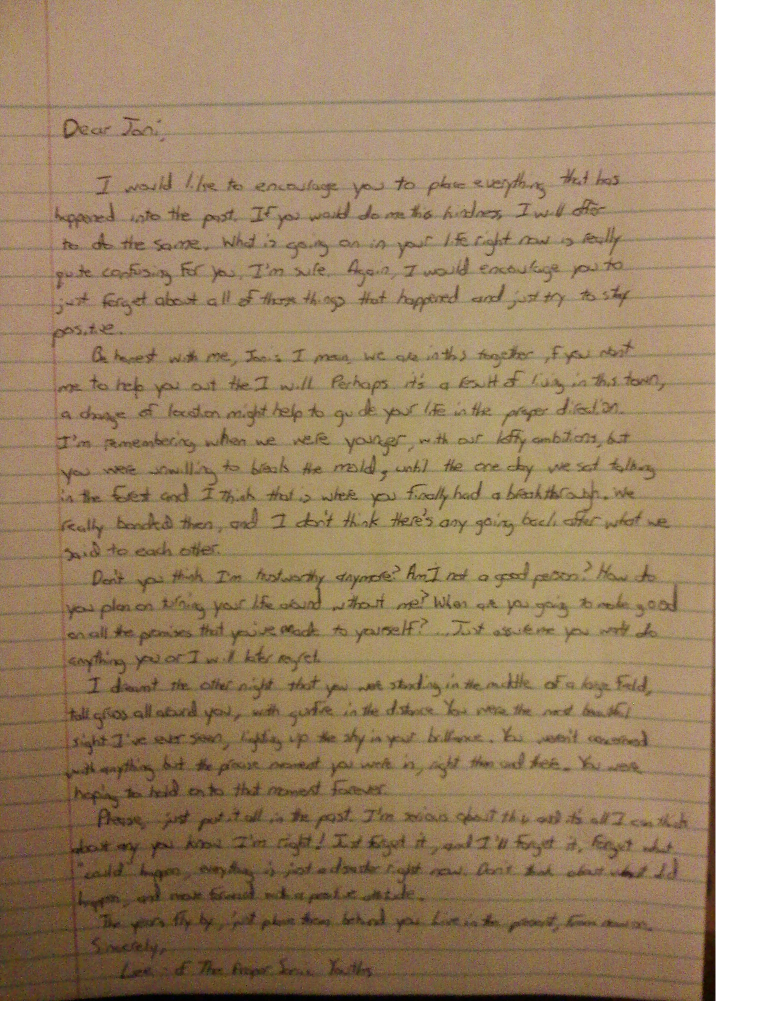I really never thought that it would come to this. I have been a subscriber to your magazine for several years now. Each time that I was offered the opportunity to re-subscribe I did so. I’m currently paid up to receive your magazine until May, 2013. So confident was I when I first subscribed to your magazine that I couldn’t think of not being informed and enlightened by your staff’s thoughtful writing.
This isn’t to say that I always understood everything that was presented, for example many of the discussions on the “housing bubble” and other economic and financial issues are hard for me to grasp. The fact that I didn’t understand them certainly wasn’t because those particular articles were poorly written, rather they just lie outside my interests.
I should have seen it coming! This was all foreshadowing so clearly your true objective at Newsweek. To you money is the most important thing in life. It’s worth being worried about, it’s worth living and dying for. Money is a tangible result of hard work and apparently the only thing of any utility in our country.
That conclusion comes from recently reading your chart that so helpfully ranks what you feel to be the “Most Useless College Degrees”, posted to The Daily Beast on April 27, 2011 at http://www.thedailybeast.com/blogs-and-stories/2011-04-27/useless-college-majors-from-journalism-to-psychology-to-theater/.
Useless.
It’s clear that you feel that there is such a thing as a wasted education. That alone is an extremely dangerous concept. I implore you to consider the implications of stating that any university degree can be deemed useless. Did any of you actually attend university? I can’t understand how a person that has successfully completed a degree program could possibly allow themselves to think this way, let alone publish something as offensive and damaging as this “study”.
My degrees in particular were ranked at number 7. I currently hold several degrees that you consider useless; a Bachelors of Music in Compositon (BMus. Composition), a Masters of Music Theory and Composition (M.M. Theory/Composition) and a Masters of Music Performance in Classical Guitar (M.M. Performance). I am furious to think that anyone would think of these as useless degrees of any rank; enough so to tell you why you are quite wrong. Thoughts such as yours are ultimately contributing to the ruin of this country.
Your “uselessness” is based on only the typical earning potential of the degree and how many jobs are typically available in the given field. This is ridiculous, biased thinking at such a basic level. Music and art are at the forefront (or should be) of any truly free society. By stating that studying music is useless to any measure is allowing the United States to become the lazy, slovenly, money hungry, cultureless society that many in the world already see us as.
According to your findings you would rather have me be unhappy and rich; not serving to attempt to build up our country’s battered and disappearing culture every single day. As musicians that is what we are all currently doing.
Saying that studying music is useless is kowtowing to the idea that our worth as people, and as a country, is almost completely dependent upon our worth in dollars and cents. How much a person earns in a year makes that person of more utility according to you. Though there are, admittedly, philanthropic individuals that spend their money doing things for our country that our government can’t seem to do, there are relatively few of them and literally tens of millions of the rest of us trying to make a difference every day in whatever way that we can.
I don’t even want to get into the studies that prove the usefulness of a well rounded education that includes studies of music and the arts. We have all read them, and we all know that it is one of the things that stands in the way of making the United States one of the truly great nations of the world.
I appreciate the timing of your little publication too. Just as undergraduates around this country are getting ready to step out into the job force; teaching, working and fighting to keep our culture from dying at the hands of close-minded cretins such as yourselves.
Every student that I knew when I was at the university knew that their earning potential would not allow them an extravagant lifestyle. The truly amazing thing about us though is that it doesn’t stop many of us. We know that there are much more important things to live our lives for. Musicians are quite often the butt of jokes regarding pay, where success is ultimately determined by how large a paycheck we can bring in. Vox populi can’t see, and doesn’t want to learn of how useful having hard working, brilliant, non-traditional thinkers such as musicians and artists around truly is. Thanks to you these troglodytes are substantiated in their ignorance.
I suppose that ultimately I am speaking to something you can’t really understand. I’m sorry. I know that all of you have obviously spent your lives doing very important, useful things. Important and expensive things. I only wish that I could have enough confidence and bravado that I could reach out to a nationwide audience and castigate entire groups of hard working people, that do important work, as useless. It’s funny, really, that the classless are attacking those of us that are doing something for reasons other than money. You have managed to make shunning culture seem like the correct, intelligent thing to do. Congratulations. That is really something.
Sarah Palin, undoubtedly one of the most fantastically and unabashedly proud ignoramuses to come into the public sphere in recent times, declared that the Federal Government needed to cut funding to NPR and the NEA because such funding is “frivolous”. It seems that you are at least somewhat in agreement with Her Royal Vapidness. I won’t even get into how cutting funding for those programs would do little to nothing to solve our budget problems. The government sees very little need to support the arts as it is. This, personally, makes me feel unwanted by even my own government. My work isn’t supported by the general population, or by the government, but that does not and should not stop us. Musicians and artists are culture warriors.
I subscribed to your magazine to support an ideal, to support a society where newspapers are going bankrupt and the ability for us as citizens to obtain free, fair and balance news is being challenged every single day. I believed in you. But, seeing as you feel that I am useless, and all of the people that I work with, study with and helped to teach- with all of their research that is being done in the name of music to help enrich our culture- are apparently useless because they are not making enough money, I can believe in you no longer. You, in fact, are beyond useless. What you have done with this pithy “study” (it was hardly a study, just salacious pandering disguised as research and journalism) is hurting the country. Just to be clear, you are hurting the country. I don’t want to have anything to do with any person or entity that so readily disposes of culture.
With this I am asking for a published apology to these concerns as well as my outstanding subscription canceled and the balance returned to me immediately. Considering I don’t have much earning potential, I’m going to need all the help I can get, right?
You can not put a price on culture. I don’t expect you to understand.
Note: A signed and dated copy of this letter was mailed to Newsweek via USPS, as well as e-mailed to them.




